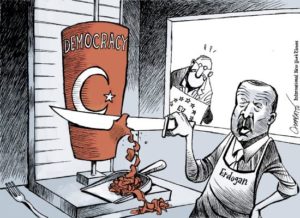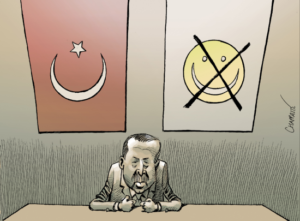Come la Turchia diventa un carcere
Notizie taciute dai grandi media internazionali e appelli di insegnanti, ricercatori e studenti turchi (*)
Il 7 febbraio scorso, in Turchia, il governo ha ordinato per decreto la revoca di 330 professori e ricercatori universitari di 48 università del paese.
Questa epurazione di un’entità senza precedenti nel mondo universitario è accompagnata, nell’ambito dello stato di emergenza, da una soppressione del diritto a un processo giusto e a una procedura regolare, dalla confisca del passaporto e da un divieto a vita di esercitare la funzione pubblica. Il 22 febbraio scorso, la storica Noémi Lévy-Aksu, ricercatrice associata al CETOBAC (EHESS) e all’Istituto francese di studi anatolici (IFEA, Istanbul), e il sociologo Ali Abbas dell’Università di Boğaziçi (Istanbul) sono stati rimossi dal loro incarico. Il loro permesso di lavoro è stato annullato dal Consiglio dell’istruzione superiore (YÖK). Una manifestazione di sostegno si è tenuta all’interno dell’Università di Boğaziçi lunedì 13 marzo. In rete potete trovare il discorso pronunciato da Noémi Lévy-Aksu davanti ai suoi colleghi e ai suoi studenti il 10 marzo scorso.
In seguito al tentativo di colpo di stato del 15 luglio 2016, il numero di licenziamenti di universitari ha raggiunto le 4811 unità, su un totale di circa 130mila funzionari licenziati o sospesi (di cui 30mila insegnanti di scuola elementare o secondaria, ma anche dei poliziotti, magistrati, militari ecc.). Sindacalisti, giornalisti e avvocati sono tra le prime vittime delle epurazioni e della repressione. I numeri sono considerevoli e le conseguenze di questa repressione disastrose per la vita degli universitari. Il 25 febbraio scorso abbiamo appreso del suicidio di Mehmet Fatih Traş, assistente di ricerca alla facoltà di scienze economiche e amministrative dell’Università di Çukurova, e firmatario della petizione per la pace (vedi oltre). Una lettera aperta, lanciata da un collettivo di universitari in Francia, è stata pubblicata dal quotidiano “Libération” il 9 marzo scorso.
Le conseguenze sono drammatiche anche per l’insegnamento superiore (112 università del Paese sono state toccate dalle epurazioni), per il pluralismo accademico e per la libertà di espressione in Turchia. All’Università di Ankara, 66 corsi sono stati sospesi e 127 studenti si trovano privi di supervisione scientifica e pedagogica per la preparazione della tesi di laurea o di dottorato.
La maggioranza degli universitari che sono stati licenziati il 7 febbraio scorso (184 su 330) sono firmatari della petizione « Non saremo complici di questo crimine ! », lanciata del collettivo Universitari per la pace che aveva raccolto 1128 firme, a gennaio del 2016 (oggi le firme sono 2212). La petizione denunciava le operazioni militari anti-kurde che l’esercito turco conduce dal luglio 2015 nel sud-est del Paese, e che non si sono ancora fermate (vedi il rapporto che l’ONU ha pubblicato il 10 marzo e che denuncia le gravi violazioni dei diritti umani nella regione, tra luglio e dicembre 2016). Non appena la petizione è stata fatta circolare, la comunità universitaria turca è stata colpita da minacce verbali o fisiche, da misure punitive attuate dallo YÖK e dal Consiglio scientifico e tecnologico (Tübitak), da divieti di uscire dal territorio turco, da licenziamenti e da azioni giudiziari e amministrative per « terrorismo » o « complicità in terrorismo ». Ad oggi, 312 dei 330 universitari per la pace sono stati licenziati.
La repressione si è ulteriormente aggravata, in seguito al tentativo di “colpo di stato” del 15 luglio 2016, con la pubblicazione di una serie di decreti governativo, secondo una forma prevista dallo stato di emergenza, mettendo a tacere qualsiasi forma di opposizione o di critica alla politica del governo. Gli universitari sono stati licenziati sotto l’accusa pretestuosa di appartenenza a «un’organizzazione terrorista», in riferimento alla confraternita Gülen – che il governo turco accusa di aver organizzato il tentativo di colpo di stato – o al PKK (Partito dei lavoratori del Kurdistan). Questi universitari sono in gran parte firmatari della petizione per la pace o membri del sindacato dei lavoratori dell’insegnamento e della ricerca Eğitim-Sen. Per denunciare questa epurazione su larga scala, il sindacato ha organizzato il 10 febbraio scorso manifestazioni in varie città del Paese, alcune delle quali sono state violentemente represse. È successo per esempio all’università di Ankara, dove la polizia ha fermato una decina di universitari, mantenendoli in custodia cautelare, poi rilasciandoli.
Mentre le notizie sulla repressione degli universitari e della libertà di espressione in Turchia si succedono in modo inquietante, la stampa e i media europei non trasmettono o trasmettono molto poco queste informazioni. È urgente informare, denunciare e opporsi a questa repressione nel modo il più possibile efficace.
Per questo riportiamo qui di seguito vari appelli alla solidarietà dei nostri colleghi insegnanti, ricercatori e studenti di Turchia:
1. Gli studenti di Siyasal – facoltà di Scienze politiche dell’Università di Ankara, la più colpita dalle epurazioni – stanno portando avanti da più di due settimane azioni di denuncia della revoca dei loro insegnanti licenziati nell’ambito della campagna « No, non ce ne andiamo » : boicottaggio dei corsi, occupazione del campus, lettura dei lavori dei professori licenziati (« Leggiamo i nostri professori »). Hanno inoltre lanciato un appello internazionale per raccogliere foto e video in solidarietà con le loro azioni e che diffondano i loro messaggi. Invitano a riprendere i loro slogan: « Siyasal è ovunque », « No, non ce ne andiamo », « Non toccate il mio professore », ecc. Due gruppi facebook riportano le iniziative della comunità universitaria e studentesca in Turchia e all’estero : They do not leave and they are not alone (in inglese) ; Siyasal Her Yerde (in turco). In Francia, i dottorandi di Sciences Po Aix e gli studenti dell’Università Lille 3 hanno contribuito a questa campagna, estendendo la loro solidarietà a tutti gli universitari di Turchia. Potete partecipare a questa azione condividendo le vostro foto sui social network e i media.
2. Un’altra azione urgente consiste a fare in modo che le attività di ricerca degli universitari turchi possano continuare. Una soluzione consiste nel creare bandi a progetto a cui gli universitari licenziati possano aderire senza dover uscire dal Paese. Privati della loro libertà di circolazione, gli universitari turchi hanno sottolineato l’efficacia di programmi di ricerca finanziati da istituzioni/università europee e realizzabili in Turchia.
3. Sono state lanciate raccolte di « fondi di solidarietà » per sostenere le persone licenziate. I fondi possono loro permettere di proseguire le ricerche, di coprire le spese legali o semplicemente di vivere decentemente. Potete fare un bonifico a favore dei fondi di solidarietà di Eğitim-Sen (per quanto riguarda le università pubbliche) e del SAV (Associazione della ricerca in scienze sociali, per quanto riguarda le università pubbliche.
Queste le coordinate bancarie:
SAV – Institute for Social Research Türkiye İş Bankası Galatasaray – Beyoğlu Branch (1011)
EURO Account IBAN NO: TR4900 0640 0000 2101 1344 2562
Eğitim Sen ING Bank Avenue Marnix 24,1000 Brussels, Belgium
IBAN: BE05 3101 0061 7075 SWIFT/BIC: BBRUBEBB / Please indicate “UAA Egitim Sen” in communication.
Infine, per restare informate/i sulla situazione e sulle azioni in corso, potete abbonarvi al news feed del Comitato francese di coordinamento delle azioni a favore degli universitari turchi per la pace (CCFR/BAK e CISUP). Per abbonarvi, basta mandare una mail con una richiesta di iscrizione a univpaca@gmail.com.
Contiamo sul vostro aiuto per far circolare il più possibile nei vostri network questo appello alla solidarietà.
Inoltre, il 25 gennaio scorso, dopo 19 anni di processo e quattro assoluzioni, la più alta giurisdizione turca ha richiesto l’ergastolo per la sociologa turca Pinar Selek. Martedì 7 marzo scorso, il comitato di sostegno per Pinar Selek ha organizzato una conferenza stampa a Nizza, in presenza della ricercatrice (vedi dettagli qui sotto).
La conferenza stampa ha fornito l’occasione di commentare la richiesta del procuratore della Corte di cassazione di annullare la quarta decisione di assoluzione pronunciata nel 2014 contro Pinar Selek. La ricercatrice era stata incarcerata l’11 luglio1998 a Istanbul mentre conduceva una ricerca sui militanti kurdi. Era stata accusata di complicità con il PKK e torturata per avere i nomi degli informatori incontrati nell’ambito della sua ricerca. Accusata in seguito di attentato terrorista, è accusata di aver lanciato una bomba che ha fatto sette morti al mercato delle spezie di Istanbul il 9 luglio 1998. Secondo l’opinione espressa in diversi rapporti di periti, l’esplosione accidentale sarebbe stata provocata da una bombola di gas. Pinar Selek viene liberata nel 2000 per mancanza di prove tangibili. È stata processata e assolta tre volte, nel 2006, nel 2008 e nel 2011. Esiliata in Francia dal 2011, oggi insegna scienze politiche all’Università di Nizza Sophia Antipolis. Più informazioni sul sito di Pinar Selek.
Per aderire al comitato di sostegno, scrivete a: ldh.nice@ldh-france.org
Restiamo mobilitati e solidali.
Universitaires solidaires
Sarah Sajn, CHERPA, Sciences Po Aix
Morgane Dujmovic, TELEMME, AMU-CNRS
Chiara Pettenella, CHERPA, Sciences Po Aix
Elen Le Chêne, CHERPA, Sciences Po Aix
Pinar Selek, féministe
Minacciata di ergastolo in Turchia
Comitato di Sostegno a Pinar Seleken
Noémi Lévy-Aksu
Boğaziçi University
10 March 2017
Freedom of speech and beyond: Resisting in the academic sphere
First of all, let me briefly introduce myself. I am French, I have been living in Turkey since 2003, and I have been working at Boğaziçi University since 2010 as a full-time faculty member. As you know, I signed the Petition of the Academics for Peace in January 2016. I learnt this Wednesday [8 March 2017] that the Council of Higher Education [Yüksek Öğretim Kurulu, YÖK] in Ankara had revoked my work permit on February 22th, 2017, without giving any reason. This decision also targeted Prof. Abbas Vali, the other foreign signatory of the petition in our university, who had just resigned from our sociology department. Coincidentally, two days before [6 March 2017], I had passed an oral exam in Ankara, which granted me the right to become an Associate Professor; hopefully this will be useful in a close future.
Freedom of speech is the kind of values that everyone acknowledges and claims for himself/herself. But, as we all know, today this freedom is severely restricted in Turkey, not only in the universities, but also in many institutions as well as the media. I will briefly talk about what is going on in the universities. Hundreds of academics from both public and private universities, who signed the petition of the Academics for Peace, have been dismissed, together with other critical voices. Via emergency decrees and other administrative measures, they have lost their jobs, but also their social insurance and often their passports, which makes it impossible for them to travel abroad. At the same time, they have to face various forms of social pressure and prosecution.
In short, my experience is far from being unique and I am in a much easier situation than many others. In this sense, if there is a protest in Boğaziçi University these days, this will be not only for me but also for all the academics who have been unfairly discharged, in Mardin, Kocaeli, Ankara and many other places. Being from Boğaziçi University or being a foreigner should not a make a difference, I don’t want special treatment. Actually, what I resented the most in the YÖK’s decision is to be singled out as a foreigner. I leave this distinction to the Council of Higher Education. I do not feel myself like a ‘foreigner’ here. I hope you will agree.
To come back to Turkey and freedom of speech, the aim of the purges in the universities is clearly to punish critical voices, to silence them. University is not just any institution. It plays a major role in shaping the present and the future of democracy. Therefore, what is going on in Turkey is not only sad and harmful for those who are discharged and for the students. It also does great damage to the scientific and cultural production and, beyond this, to the future of Turkey.
Yet, let’s not feel hopeless! Since I learnt the decision, I have felt much sadness and fear in the expressions of support which I received. I thank you all for your support and solidarity but my state of my mind is quite different, I don’t feel hopeless. The universities are central for freedom of speech and for critical thought. But there are other places too. Many academics continue to write and act in resistance, in the streets, in alternative academies, and from abroad. Beyond this, I do believe that the tragic situation in the universities will not last forever and that we will be able to come back.
However, what is going on in Turkey is not only an attack against freedom of speech: it is the destruction of the rule of law. Therefore, we should not only react to defend freedom of speech, but also rise against this broader process. My current research interest is on the equivalent of the state of emergency in the Ottoman Empire and I focus on questions such as the suspension of law, the restriction of freedoms for the sake of state security and the erosion of constitutional rights. I study these issues within the Ottoman context, but they are fully relevant to today’s situation. You don’t need to be a member of a political organization or an activist to rise against the severe human rights violations which are taking place in Turkey, especially in the Kurdish regions. Nor you need to be a Turkish citizen. I am none of these. When I signed the Peace petition, I listened to my conscience, and I will continue to do so, together with many others. You may call it a political standpoint, but what “political” means here is neither party membership nor opposition to another party. Peace, freedom and justice should be the common set of values that bind us together, despite our political divisions.
I have been teaching the history of Modern Turkey for a few years. This is a class which I really enjoy, where discuss many controversial issues, like the Armenian and Kurdish questions. The aim of my teaching is not to impose my thoughts on anyone but to open a space for discussion on these issues. We are lucky enough to have this freedom at Boğaziçi University. We should be aware of it and use it as much as possible. We need to go beyond political polarization, without trying to oppress or silence the others. I truly believe we can gather around common ethical values, as academics, students, and staff. At least, we should try to.
I would like to end with an historical example. Normally, as part of this course [Hist 106: The Making of the Modern World], I give lectures on the rise of fascism and World War II. I will take an example from this period and conclude with some comments on resistance in the academic sphere. As a preliminary, I want to make it clear that the aim of this historical digression is not to imply that today’s Turkey is the equivalent of the fascist regimes in these times. My aim is rather to reflect with you upon ways to resist against oppressive regimes in the universities and beyond.
Today, there are many historians and history students among us, both from our department and from elsewhere. In your historiography classes, I am sure you heard of the Annales school, a major historiographical movement which was initiated by Lucien Febvre and Marc Bloch and brought a new perspective to the historical field. Don’t worry, I will not lecture on historiography today; I just want to remind you of a much discussed episode in the history of Annales.
After the German occupation of France during World War II, Lucien Febvre and Marc Bloch were faced with a difficult dilemma: since Bloch was Jewish, he could not anymore be the co-proprietor of the Annales and his name had to be dropped from the journal. The correspondence between Bloch and Febvre in this period is gloomy and thought-provoking. When Febvre wrote to Bloch and asked him whether the journal should continue in these conditions, Bloch strenuously resisted this idea and the publication under German censorship. Yet, Febvre objected to his answer, arguing that the Annales had the duty to continue and bring an intellectual contribution to the resistance against the Nazis. He finally convinced Bloch and managed to publish the journal throughout the war, with valuable intellectual contributions and a dose of critical spirit. Meanwhile, Bloch, who had been discharged from his academic position, joined the Resistance movement and he was executed by the Gestapo in June 1944.
Much has been written about this episode. Was Febvre a kind of collaborationist? Or should we consider his intellectual work during the war in the framework of a broader understanding of resistance? Especially if we consider the level of oppression and violence in that period, we should not rush to blame Febvre’s choice. Beyond the case of the Annales, this episode epitomizes the challenges of resistance against authoritarian power, in the academic sphere and beyond.
How shall we resist as academics? Whenever it is possible, we shall keep in mind Febvre and Bloch’s arguments and try to achieve both: continuing our studies, classes, scientific and intellectual work on the one hand; criticizing, protesting, resisting to the unacceptable on the other hand. These are not mutually exclusive and the university is precisely the space which can bring them together. Not always unfortunately.
I love Boğaziçi University, my job, and above all I love my students. Therefore, I will fight by all means to regain my position and to continue to live in Turkey. Yet, if I am compelled to choose between my academic position and my freedom of speech or my right to rise against injustice, without any hesitation I’ll choose the second option. In a way, the decision of the Council of Higher Education has made this choice for me. But if they can discharge my colleagues and me, they cannot silence us. We will continue our intellectual production, we will continue to criticize and resist. Don’t remain silent!
Note: This talk was delivered in Turkish at Boğaziçi University on March 10, 2017. I am grateful to my friends and colleagues at the Department of History, who gave me warm support and invited me to give this talk. This English translation is an edited and slightly modified version of the Turkish paper.
Source: https://www.youtube.com/watch?v=VzXGaoyvGBc
(*) ringrazio Salvatore Palidda per queste segnalazioni. Le immagini – di Carlos Latuff, Chappatte, Brandan Reynolds, Naoufal Lahlali, Kalmius e Mauro Biani – sono state scelte dalla redazione della “bottega”. [db]










